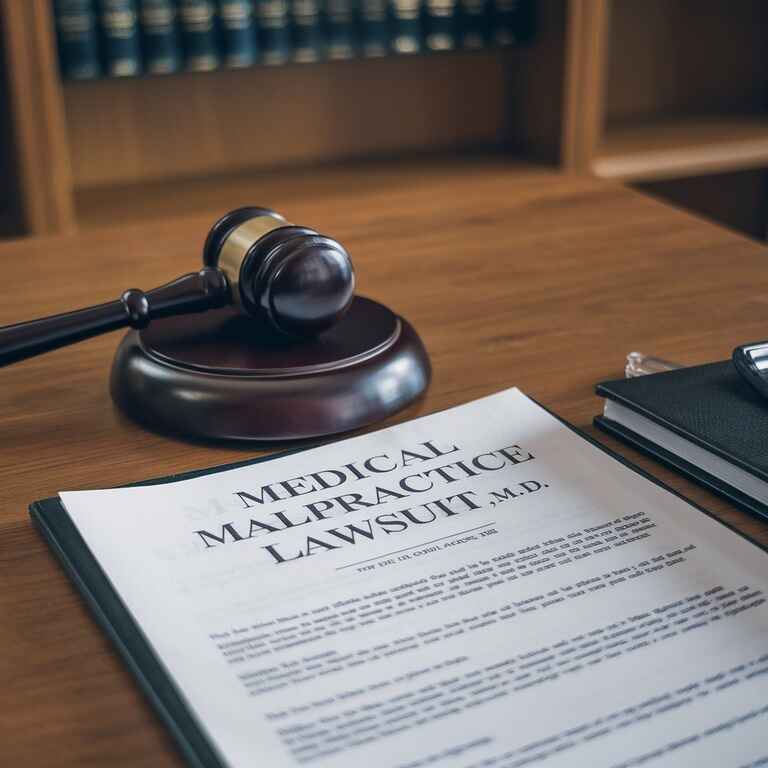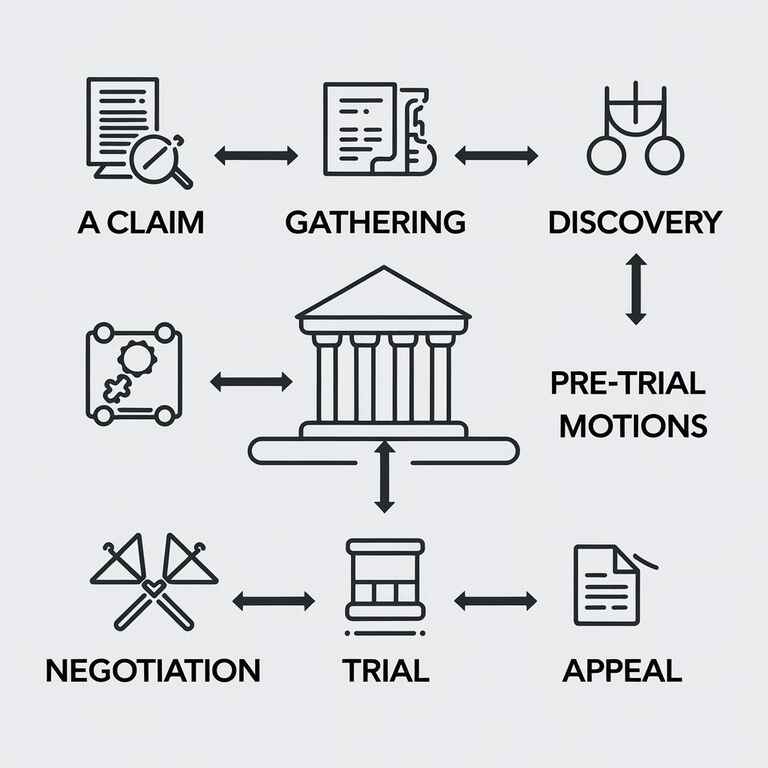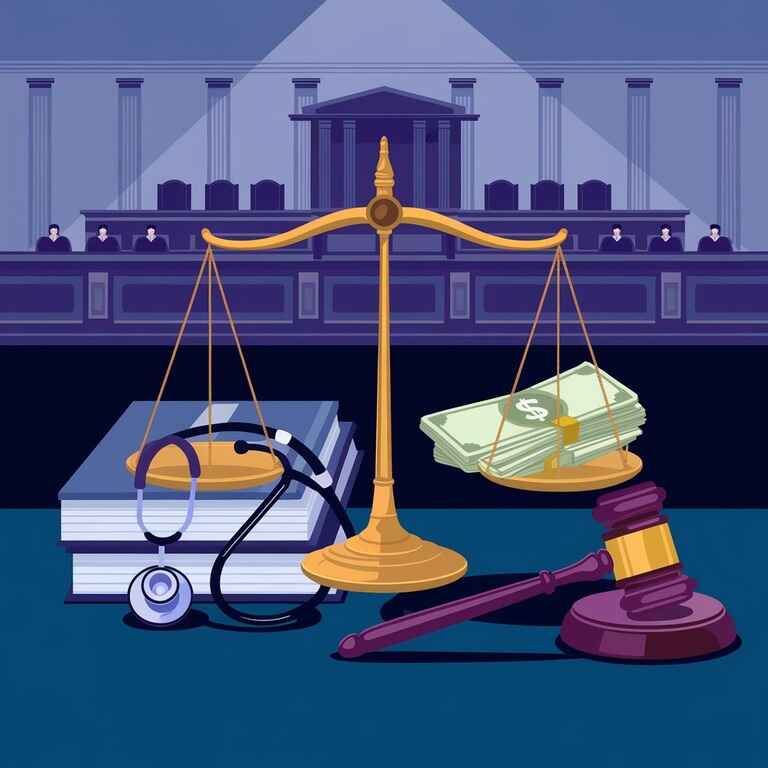Medical malpractice is a serious issue that affects thousands of patients each year. In Nevada, like many other states, medical malpractice laws are designed to protect patients whose negligence or misconduct of healthcare professionals has harmed them. Medical malpractice can have long-lasting effects on individuals and families, whether it’s due to surgical errors, misdiagnosis, or failure to provide adequate care.
Understanding Nevada’s medical malpractice laws is crucial for anyone who believes they have been a victim of healthcare negligence. By familiarizing yourself with these laws, you can better protect your legal rights and navigate the complex process of seeking compensation. This guide will explain what constitutes medical malpractice, how claims are filed, and what victims can expect during the legal process.
 What Constitutes Medical Malpractice in Nevada
What Constitutes Medical Malpractice in Nevada
Definition of Medical Malpractice
In Nevada, medical malpractice occurs when a healthcare provider—such as a doctor, nurse, or hospital—fails to provide the standard of care that a reasonable professional would under similar circumstances, leading to harm or injury to the patient. The law defines this as a breach of the duty of care that a medical provider owes to a patient, which results in physical, emotional, or financial damage.
Common Examples of Malpractice in Healthcare
There are several medical malpractice claims, each relating to different forms of negligence. Common examples include:
- Misdiagnosis or delayed diagnosis: A healthcare provider fails to diagnose a condition or diagnoses it too late, leading to further complications or a worsened condition.
- Surgical errors are mistakes made during surgery, such as operating on the wrong site, leaving foreign objects inside the body, or damaging organs.
- Medication errors: Administering the wrong medication or dosage that harms the patient.
- Anesthesia errors are mistakes in the administration of anesthesia, such as giving the wrong dose or failing to monitor the patient properly.
- Birth injuries: Errors during childbirth that result in injury to the newborn or mother, such as improper use of forceps or failure to monitor the baby’s heart rate.
Difference Between Medical Negligence and Malpractice
While all malpractice involves negligence, not all negligence rises to the level of malpractice. Negligence refers to any failure to exercise reasonable care, but to qualify as malpractice in Nevada, the negligence must meet specific criteria:
- The healthcare provider’s actions or inactions must deviate from the accepted standard of care.
- The patient must have suffered harm or injury due to that deviation.
If the negligence did not lead to harm or the healthcare provider’s actions were in line with established standards, it may not be considered malpractice.
Key Elements of a Medical Malpractice Claim
To successfully pursue a medical malpractice claim in Nevada, the plaintiff (the person filing the lawsuit) must prove several key elements. These elements establish whether medical malpractice occurred and whether the healthcare provider should be liable for the patient’s injuries.
Establishing the Standard of Care
The first step in any medical malpractice case is establishing the standard of care that should have been provided. The standard of care refers to the level of care and skill that a competent healthcare provider in the same field would have offered under similar circumstances. This is a critical element of the case because it is the benchmark against which the defendant’s actions will be judged.
Proving a Breach of the Standard of Care
Once the standard of care is established, the plaintiff must show that the healthcare provider breached this standard. A breach occurs when the provider’s actions (or lack of actions) fall short of what is expected in the medical community. This could involve:
- Failing to perform the necessary tests or procedures.
- Administering improper treatment or medication.
- Failing to act promptly when the patient’s condition worsens.
In most cases, expert witnesses, such as other medical professionals, will be required to testify about the standard of care and how the defendant fell short.
Causation: Linking the Breach to the Injury
To win a medical malpractice lawsuit, the plaintiff must show that the healthcare provider’s breach of the standard of care directly caused the injury or harm. This is known as causation. The plaintiff must demonstrate that the injury or damage would not have occurred if the healthcare provider followed the correct standard of care.
Damages: Types of Harm Victims Can Claim
Medical malpractice victims may be entitled to compensation for various types of damages, including:
- Economic damages include medical bills, lost wages, and any other financial costs incurred due to the malpractice.
- Non-economic damages: These are compensation for intangible harm, such as pain and suffering, emotional distress, and loss of enjoyment of life.
- Punitive damages: In rare cases, if the healthcare provider’s conduct was reckless or egregious, the court may award punitive damages to punish the wrongdoer and deter similar behavior.
These damages are critical in helping victims recover their injuries’ costs and rebuild their lives.

Nevada Medical Malpractice Statutes and Regulations
Overview of Nevada’s Medical Malpractice Laws
Nevada has specific laws that govern medical malpractice claims. These laws are designed to ensure that patients who are harmed by negligent medical care can seek justice. Medical malpractice claims in Nevada are subject to strict rules, including limitations on how long a person has to file a lawsuit and requirements for handling the case.
One key aspect of Nevada’s medical malpractice laws is the requirement that plaintiffs obtain a Certificate of Merit. This certificate, signed by a qualified medical expert, states that the healthcare provider’s actions were below the accepted standard of care.
Relevant Statutes Governing Medical Malpractice Claims
Several Nevada statutes and regulations impact how medical malpractice cases are handled. Key ones include:
- NRS 41A.010 – 41A.100: These statutes define medical malpractice and outline the requirements for filing a lawsuit, including the Certificate of Merit.
- NRS 41A.035: This section limits the amount of non-economic damages (such as pain and suffering) a victim can receive in some instances. It’s important to note that this cap does not apply to all damages.
- NRS 41A.015: This law outlines the statute of limitations, setting a time limit on how long a person has to file a medical malpractice claim in Nevada.
Time Limits (Statute of Limitations) for Filing a Claim
In Nevada, the statute of limitations for filing a medical malpractice lawsuit is generally three years from the date the alleged malpractice occurred. However, there are exceptions. For example:
- If the injury was not immediately discovered, the statute of limitations may begin when the patient reasonably discovers the injury or when the injury could have been found with reasonable diligence. This is known as the “discovery rule.”
- The time limit may be extended if the malpractice involves fraud or intentional misconduct.
It’s crucial to act quickly if you believe you have been a victim of medical malpractice. Missing the filing deadline can result in your case being dismissed, regardless of its merits.
Special Rules for Medical Professionals in Nevada
Nevada law also has specific rules for certain types of medical professionals. For example, healthcare providers the government or a public agency employs may have different legal protections, including immunity from certain lawsuits.
Another important aspect is that Nevada requires healthcare professionals to carry malpractice insurance to cover potential claims. This helps ensure that victims can obtain compensation even if the healthcare provider lacks the financial resources to pay.
How to File a Medical Malpractice Claim in Nevada
Filing a medical malpractice claim in Nevada can be complex. Here’s a breakdown of the steps involved in the process.
Steps to Take Before Filing a Lawsuit
Before filing a lawsuit, it’s essential to take a few key steps:
- Seek a second opinion: If you suspect medical malpractice, it’s essential to seek a second opinion from another healthcare provider. This can help confirm whether the care you received was substandard.
- Document everything: Record your medical history, including appointments, prescriptions, treatments, and any communication with the healthcare provider. This documentation will be essential in your case.
- Consult a medical malpractice lawyer: An experienced lawyer can guide you through the process and help determine whether you have a valid claim.
Finding a Qualified Medical Malpractice Lawyer in Nevada
Choosing the right attorney is one of the most critical steps in a medical malpractice case. Here are some qualities to look for in a lawyer:
- Experience: Look for a lawyer with specific experience handling medical malpractice cases in Nevada.
- Track record: Ask about the lawyer’s success rate with similar cases.
- Communication: A good lawyer should be easy to talk to and keep you informed throughout the process.
Filing a Complaint and Serving the Healthcare Provider
Once you’ve hired a lawyer, the next step is to file a complaint with the court. The complaint will outline the details of your case, including:
- The healthcare provider’s actions (or inactions) that caused harm.
- How these actions breached the standard of care.
- The injuries or damages you sustained as a result.
Once the complaint is filed, the healthcare provider (or their legal team) will receive a copy of the lawsuit and have an opportunity to respond to the allegations.
The Role of Expert Witnesses in Medical Malpractice Cases
Expert witnesses play a critical role in medical malpractice cases. These professionals are typically other doctors or healthcare providers with expertise in the relevant area of medicine. They help establish whether the defendant’s actions met the standard of care and whether the injuries were directly caused by malpractice.
In Nevada, a Certificate of Merit is required, which means your lawyer will need to work with an expert to confirm the validity of your claim before proceeding with a lawsuit.

Statute of Limitations for Medical Malpractice Cases in Nevada
Time Limits for Filing Medical Malpractice Claims
The statute of limitations in Nevada determines how long you must file a medical malpractice lawsuit. If you believe you’ve been a victim of malpractice, it’s critical to be aware of these deadlines. Failing to meet the time limit can result in your case being dismissed, no matter how strong your evidence is.
The general rule is that you must file a lawsuit three years from the date the malpractice occurred. However, there are exceptions to this rule, which may extend or shorten the deadline.
Exceptions to the Statute of Limitations
There are a few exceptions to the three-year time limit that can affect when your lawsuit must be filed:
- Discovery rule: If you didn’t immediately know about the malpractice, the statute of limitations may start when you discover—or should have discovered—the injury. For example, if a misdiagnosis was not found until years later, the clock may begin from when the error was discovered.
- Minors: If the patient is a child (under 18 years old) when the malpractice occurs, the statute of limitations is extended. The child has until their 19th birthday to file a claim.
- Fraud or intentional misconduct: If the healthcare provider intentionally covered up their mistakes or fraudulently concealed the malpractice, the statute of limitations may be extended. In these cases, the deadline is based on when the fraud was discovered.
The Importance of Acting Promptly
Time is of the essence in medical malpractice cases. Even if you think the injury occurred long ago, it’s essential to consult with an attorney as soon as possible to protect your rights. Legal professionals can assess your case, gather necessary documentation, and file your lawsuit within the required time frame.
Caps on Damages in Nevada Medical Malpractice Cases
Nevada’s Laws on Damage Caps
In Nevada, there are specific caps or limits on the amount of money a plaintiff can receive in certain types of damages in medical malpractice cases. This can impact a victim’s total compensation, especially in cases involving pain and suffering or emotional distress.
Nevada law limits the amount of non-economic damages a victim can recover. Non-economic damages are compensation for things like:
- Pain and suffering
- Emotional distress
- Loss of companionship
The cap for non-economic damages in medical malpractice cases is $350,000 per defendant. Even if the jury awards more than this amount, the damages will be reduced to the cap.
What About Economic Damages?
There is no cap on economic damages in Nevada. Economic damages cover actual financial losses, such as:
- Medical expenses (past and future)
- Lost wages or earning capacity
- Rehabilitation costs
These damages can be substantial in medical malpractice cases, and victims can be fully compensated for their out-of-pocket expenses and lost income.
How Damage Caps Can Affect Victims’ Compensation
While the $350,000 cap on non-economic damages may seem like a lot, it can be limiting in cases where the victim has suffered significant emotional distress or pain. For example, a person who undergoes extensive surgery and faces permanent disfigurement or debilitating pain might receive substantial economic damages. Still, their emotional pain may not be compensated to the full extent they deserve under Nevada’s damage caps.
Victims should discuss the impact of these caps with their attorney to understand how it will affect their potential settlement or award.

Medical Malpractice Lawsuits Process in Nevada
Filing a Medical Malpractice Lawsuit in Nevada
Filing a medical malpractice lawsuit is a multi-step process. It requires careful planning, preparation, and legal expertise. Here’s a quick breakdown of the process:
- Pre-suit investigation: Before filing, your lawyer will conduct a thorough investigation, which may involve reviewing medical records and consulting experts to build your case.
- Filing the complaint: The lawsuit begins when your lawyer files a complaint with the court. The complaint will outline the details of your case, including the negligence and harm caused by the healthcare provider.
- Serving the defendant: After filing, the defendant (the healthcare provider) must be served with a copy of the complaint, notifying them of the lawsuit.
Pre-lawsuit Procedures (e.g., Filing a Notice of Intent to Sue)
In Nevada, you must send a Notice of Intent to Sue to the healthcare provider or facility before filing a lawsuit. This notice allows them to review the allegations and attempt to settle them before the lawsuit is formally filed.
In addition to the Notice of Intent, Nevada requires a Certificate of Merit to be filed along with the lawsuit. This certificate, signed by a medical expert, confirms sufficient evidence to support your claim that malpractice occurred.
Discovery Phase and Gathering Evidence
After the lawsuit is filed, the discovery phase begins. This is when both sides exchange information and gather evidence to support their case. Discovery can include:
- Depositions: Sworn statements from witnesses and experts.
- Interrogatories: Written questions that the other party must answer.
- Document requests: Requests for relevant medical records and other documents.
The discovery phase is often lengthy and can be complex as both parties work to build their cases.
Settlement Options and Trial Processes
Many medical malpractice cases are settled through negotiations before going to trial. Settlements can offer victims compensation without the need for a lengthy trial. However, the case will go to trial if a settlement is not reached. During the trial, both sides will present their evidence, and a judge or jury will determine the outcome.
At trial, the plaintiff’s attorney will present expert testimony, medical records, and other evidence to prove the healthcare provider’s actions were negligent. The defendant will have the opportunity to present their evidence and arguments.
Common Defenses Used in Nevada Medical Malpractice Cases
In medical malpractice cases, the defendant (typically the healthcare provider or institution) has the right to defend themselves against the claims. Some common defenses used in Nevada include:
Contributory Negligence and Patient Responsibility
One defense healthcare providers might use is contributory negligence. This means the defendant argues that the patient’s actions (or lack of actions) contributed to their injury. For example, suppose the patient failed to follow medical advice or did not seek timely treatment. In that case, the defendant may claim that the injury would have been less severe or preventable if the patient had acted differently.
In some cases, the defendant might argue that the patient was responsible for their injury. For instance, if a patient did not disclose necessary health information that could have influenced the treatment plan, this might be used as a defense.
The Defense of Good Faith and Adherence to Medical Standards
Another common defense is that the healthcare provider acted in good faith and followed the appropriate medical standards. The defendant might argue that the treatment or diagnosis was consistent with what a reasonable professional would have done under similar circumstances.
This defense relies heavily on expert testimony. The defendant typically brings in medical professionals to testify that their actions were in accordance with the accepted standard of care in the medical community.
Expert Testimony and Challenges to Causation
In many medical malpractice cases, expert testimony is essential. Defendants often challenge the causation element of the plaintiff’s case. In other words, the defendant may argue that their actions did not cause the alleged injury but by something else entirely. For example, they might say that the injury occurred due to an underlying medical condition or that the patient’s health was beyond repair, even if they had provided the correct treatment.
To overcome this defense, the plaintiff must provide substantial evidence and expert testimony to prove that the defendant’s actions directly caused the harm.
Comparative Fault Laws in Nevada
Nevada follows a comparative fault rule, which means that if the defendant can show that the plaintiff is partially responsible for the injury, the damages can be reduced based on the percentage of fault assigned to the patient. For example, if the defendant argues that the patient was 20% at fault for the injury, compensation will be reduced by 20%.
It’s important to note that in Nevada, even if the plaintiff is partially at fault, they can still recover damages if their fault is less than 50%. If the plaintiff’s fault exceeds 50%, they cannot recover damages.

Compensation Available in Medical Malpractice Cases
You may be entitled to compensation if you’ve been injured due to medical malpractice in Nevada. The compensation you can receive will depend on the details of your case and the damages you can prove. There are several types of damages that victims of medical malpractice may claim.
Economic Damages: Medical Bills, Lost Wages, and More
Economic damages are the financial losses a medical malpractice victim has suffered due to negligence. These can include:
- Medical bills: The cost of hospital stays, surgeries, prescriptions, and other necessary treatments to address the injury caused by malpractice.
- Lost wages: If the injury has caused you to miss work or reduce your working hours, you may be entitled to compensation for lost income.
- Future medical costs: If the injury requires long-term care or rehabilitation, you may be entitled to compensation for these future costs.
Economic damages are designed to reimburse you for the tangible financial losses directly related to the malpractice.
Non-Economic Damages: Pain and Suffering, Emotional Distress
Non-economic damages are designed to compensate for the more subjective impacts of medical malpractice, such as:
- Pain and suffering include physical and emotional pain caused by the injury. For example, chronic pain after surgery or the emotional toll of living with permanent disability may be considered.
- Emotional distress: In severe injury or long-term consequences, emotional suffering may also be compensated. This can include feelings of anxiety, depression, or trauma caused by the malpractice.
- Loss of enjoyment of life: If your injury affects your ability to enjoy activities you once loved, such as hobbies or social events, you may be compensated for this loss.
Unlike economic damages, non-economic damages do not have a clear financial value, so they can be more challenging to prove.
Punitive Damages: When They Apply in Nevada
In some rare cases, punitive damages may be awarded. These damages are intended to punish the defendant for egregious conduct and deter others from similar behavior. Punitive damages are typically only granted if the defendant acted with recklessness, fraud, or malice.
In Nevada, punitive damages are capped at $300,000 or three times the amount of compensatory damages (economic and non-economic), whichever is greater. However, these damages are relatively rare in medical malpractice cases.
How Compensation is Calculated
The process of calculating compensation in medical malpractice cases is complex. Factors that influence the amount of compensation include:
- The severity of the injury and the long-term impact on the victim’s life.
- The amount of economic damages, such as medical bills and lost wages.
- The defendant’s degree of fault and the conduct involved in the malpractice.
- The presence of any comparative fault by the plaintiff.
An experienced attorney can help determine the amount of compensation you may be entitled to, ensuring you receive fair compensation for your injuries.
Impact of Medical Malpractice on Patients and Families
Physical and Emotional Toll of Medical Malpractice
When medical malpractice occurs, it can take a severe toll on the victim and their loved ones. The consequences can extend beyond physical injuries to affect emotional well-being, relationships, and quality of life.
Physical Impact of Medical Malpractice
Victims of medical malpractice may experience a range of physical injuries, depending on the nature of the error. These can include:
- Permanent disabilities: Some victims may suffer lifelong disabilities that require ongoing care or reduce their ability to perform daily activities.
- Worsened health conditions: An incorrect diagnosis or improper treatment may worsen an existing condition or create new health issues.
- Increased medical procedures: Often, victims of malpractice need additional surgeries or medical treatments to address the errors made, which can result in extended recovery times and higher medical costs.
Emotional and Psychological Effects
The emotional and psychological effects of medical malpractice can be just as profound as the physical injuries. Victims often experience:
- Anxiety and depression: The trauma of being harmed by healthcare providers can lead to feelings of hopelessness, sadness, or constant worry about the future.
- Loss of trust: Malpractice can make it difficult for patients to trust medical professionals again, potentially leading to delays in seeking care or avoiding necessary treatments.
- Grief: In cases where the victim loses a loved one due to medical errors, families may experience intense grief, anger, and frustration.
Financial Burden of Medical Malpractice
Medical malpractice cases often create significant financial strain. The costs of ongoing medical care, lost wages, and other financial burdens can add up quickly. These costs can include:
- High medical bills: Treatment for malpractice-related injuries can be expensive, especially if the injury requires long-term care, surgery, or rehabilitation.
- Lost income: If the victim cannot work due to injuries, lost wages can strain the family’s financial situation.
- Loss of future earning potential: For victims who experience permanent disabilities, the loss of future earning potential can be a significant financial setback.
Many families struggle with these financial challenges, and seeking compensation through a medical malpractice lawsuit can help alleviate some of the financial burdens.

How to Avoid Medical Malpractice: Tips for Patients
While not all medical malpractice cases can be prevented, there are steps you can take to reduce the risk of experiencing errors in your healthcare. Being proactive and informed can help you protect your health and your well-being.
Be an Active Participant in Your Healthcare
One of the best ways to reduce medical malpractice risk is by actively engaging in your own healthcare. This includes:
- Asking questions: Don’t be afraid to ask your doctor or healthcare provider questions about your diagnosis, treatment options, and potential risks. Understanding the details of your care helps you make informed decisions.
- Seeking second opinions: If unsure about a diagnosis or treatment plan, consider seeking a second opinion. Different doctors may have different perspectives or approaches to treatment.
- Keeping track of your medical history: Ensure all healthcare providers have access to your complete medical history. This includes past surgeries, conditions, allergies, and medications, as incomplete or inaccurate medical records can lead to errors.
- Being honest with your doctor: Always provide accurate and detailed information about your symptoms, lifestyle, and medical history. This allows your healthcare provider to make the best decisions for your care.
Choose the Right Healthcare Provider
Choosing a trustworthy healthcare provider is another key step in preventing medical malpractice. Some tips for selecting the right provider include:
- Research credentials: Ensure your doctor or specialist is appropriately licensed and has a good track record. You can check their credentials through professional medical organizations or state licensing boards.
- Consider experience: Choose a healthcare provider with expertise in your needed care. If you’re undergoing surgery or treatment for a specific condition, find a specialist with a history of successful outcomes.
- Read reviews: Look at patient reviews or testimonials. While these shouldn’t be your only deciding factor, they can offer valuable insights into a provider’s practice and reputation.
Understand Your Treatment Plan
Before undergoing any procedure or treatment, make sure you understand the following:
- What the procedure involves: Ask about the specific steps of your treatment, including any risks or side effects.
- Potential complications: Every procedure carries some risk. Understand the possible complications that could arise and how they will be addressed if they occur.
- Recovery process: Understand the recovery process, including any necessary follow-up appointments or treatments.
This information empowers you to make decisions and helps ensure that you and your doctor are on the same page regarding your treatment plan.
How a Medical Malpractice Lawyer Can Help You
Navigating a medical malpractice case can be overwhelming, but an experienced lawyer can guide you. Here’s how a lawyer can assist you:
Investigating Your Case
A medical malpractice lawyer will start by thoroughly investigating your case. They will:
- Review your medical records: A lawyer will carefully examine your medical records to identify any mistakes or errors made by your healthcare provider.
- Consult with medical experts: They will work with medical professionals to help determine whether malpractice occurred and if the defendant’s actions directly caused the injuries.
- Gather evidence: Lawyers will gather all necessary evidence, such as witness statements, medical records, and expert opinions, to build a strong case.
Navigating Legal Procedures
Medical malpractice cases are complex and require adherence to strict rules and deadlines. A lawyer can handle the legal aspects, including:
- Filing the lawsuit: They will ensure that your lawsuit is filed correctly and on time, including obtaining a Certificate of Merit and sending a Notice of Intent to Sue.
- Managing the discovery phase: Your lawyer will handle the exchange of information, ensuring that all evidence is gathered and shared by the law.
- Negotiating settlements: Many malpractice cases are settled out of court. Your lawyer will negotiate to ensure you receive a fair settlement.
Representing You in Court
If your case goes to trial, your lawyer will represent you in court, presenting your evidence, cross-examining witnesses, and arguing your case to the judge or jury. They will fight to secure the maximum compensation possible for your injuries.
A skilled lawyer will be your advocate, working tirelessly to protect your rights and ensure that you receive fair compensation for the harm you’ve suffered.

Choosing the Right Medical Malpractice Lawyer in Nevada
Key Qualities to Look for in a Lawyer
When choosing a medical malpractice lawyer, finding someone with the experience, knowledge, and dedication to handle your case is essential. Here are the key qualities to look for:
- Experience in medical malpractice: Medical malpractice cases are complex, and the lawyer you choose should specialize in this area of law. A lawyer with a track record of handling similar cases will be better equipped to navigate the nuances of your case.
- Understanding of medical terminology: Medical malpractice requires understanding medical terms and procedures. Your lawyer should be comfortable working with medical experts and interpreting complex medical records.
- Strong communication skills: The lawyer should be able to explain complex legal and medical concepts in a way that’s easy to understand. Clear communication ensures you stay informed and feel confident throughout the process.
- Track record of success: Look for a lawyer with a proven history of securing favorable client verdicts or settlements. While past success doesn’t guarantee results, it’s a good indicator of their skill and reputation.
How to Find a Lawyer in Nevada
Finding a lawyer who fits your needs can be challenging, but there are several ways to locate a qualified attorney:
- Referrals from trusted sources: Ask friends, family, or healthcare professionals for recommendations. Personal referrals can provide insight into a lawyer’s professionalism and expertise.
- Online research: Many law firms have websites that showcase their practice areas, client testimonials, and case results. Research online allows you to compare lawyers and find one with the right qualifications.
- State Bar Association: The Nevada State Bar Association has a lawyer referral service that can help you find experienced medical malpractice attorneys in your area.
What to Ask When Meeting with a Lawyer
Once you’ve narrowed your options, it’s time to meet with a few lawyers to find the one who’s right for you. During your consultation, ask these critical questions:
- What experience do you have with medical malpractice cases? Ensure that the lawyer has a history of handling similar claims.
- What is your approach to handling cases like mine? Ask how they would investigate your case and their strategy to pursue it.
- What is your fee structure? Most medical malpractice lawyers work on a contingency fee basis, meaning they don’t charge you unless they win your case. Be sure to clarify how fees will work and any additional costs that may arise.
- How long do you expect the case to take? While medical malpractice cases can be lengthy, it’s helpful to understand the estimated timeline so you know what to expect.
- Who will handle my case? Ask if the lawyer you meet with will be directly involved or if other team members will handle aspects of the case.
A good lawyer will answer your questions clearly and transparently, ensuring you feel comfortable with their approach.
Medical Malpractice Insurance in Nevada
Types of Medical Malpractice Insurance
In Nevada, healthcare providers are required to carry medical malpractice insurance to protect themselves and their patients. This insurance helps ensure that victims of medical malpractice can receive compensation for their injuries.
There are two main types of medical malpractice insurance:
- Claims-made insurance: This policy only covers reported incidents while the policy is in effect. If the provider switches insurance companies or the policy lapses, they may not be covered for incidents during the previous policy period.
- Occurrence-based insurance: This policy covers any incidents during the policy period, even if the claim is filed after the policy has ended. This type of insurance offers broader protection and more security for patients.
Nevada’s Medical Malpractice Insurance Requirements
In Nevada, healthcare providers must carry a minimum amount of medical malpractice insurance. As of recent regulations, the minimum required coverage is:
- $1 million per incident
- $3 million annual aggregate
This means a healthcare provider must have enough insurance to cover up to $1 million per claim, with a total limit of $3 million for all claims filed during the year. If a healthcare provider’s insurance coverage is insufficient to cover the damages in a malpractice case, the defendant might have to pay out-of-pocket.
How Malpractice Insurance Affects Compensation
Medical malpractice insurance plays a crucial role in the compensation process. The insurer will typically pay the settlement or judgment if you win your case. However, if the healthcare provider doesn’t carry enough insurance or doesn’t have insurance at all, it can complicate the recovery process.
If the defendant’s insurance doesn’t cover the full damages awarded, they may be required to pay the difference personally. In some cases, a plaintiff may have to explore other sources of compensation, such as government funds, additional parties who may be responsible, or assets owned by the defendant.

Breaking It All Down
Medical malpractice is a serious issue that can affect anyone, and it’s essential to know your rights if you’ve been harmed by a healthcare provider’s mistake. Nevada law provides clear guidelines for pursuing a medical malpractice claim, but the process can be complex. Whether you’re looking to understand the statute of limitations, need help finding the right lawyer, or want to know about compensation options, this guide has covered key aspects to help you navigate the legal landscape.
If you think you have been the victim of medical malpractice, don’t hesitate to contact a qualified lawyer who can evaluate your case, offer experienced advice, and help you take the necessary steps to seek justice.

Frequently Asked Questions
How Do I Know If I Have a Valid Medical Malpractice Case?
If you suspect you’ve been a victim of medical malpractice, the first step is to consult a qualified medical malpractice attorney. They can assess your case by reviewing your medical records, speaking with experts, and determining whether your healthcare provider’s actions deviated from the standard of care.
How Long Does It Take to Resolve a Medical Malpractice Case in Nevada?
The timeline for resolving a medical malpractice case can vary depending on its complexity. On average, these cases can take months or even years to resolve. Factors like the severity of the injury, the amount of evidence, and whether the case goes to trial can all impact how long it takes to settle or get a verdict.
Can I sue for medical malpractice if I Sign a consent form?
You can still sue for medical malpractice even if you signed a consent form. A consent form typically acknowledges that you understand the risks of a procedure. However, it doesn’t absolve the healthcare provider from acting negligently. If the provider’s actions deviated from the accepted standard of care, you may still have grounds for a malpractice lawsuit.
What Is the Difference Between Medical Negligence and Medical Malpractice?
Medical negligence occurs when a healthcare provider fails to meet the accepted standard of care, harming the patient. Medical malpractice is a legal term used to describe situations where medical negligence results in injury or death, and the injured party seeks compensation through a lawsuit. All malpractice cases involve negligence, but not all instances of negligence result in malpractice claims.

Additional Resources for You from The Rosenblum Allen Law Firm.
If you’re interested in learning more about other legal services or need assistance in different areas of law, we have several helpful resources that may be of interest to you:
- Criminal Defense Attorneys: Our experienced criminal defense attorneys are here to protect your rights and defend you against any criminal charges. Whether you’re facing minor infractions or serious criminal accusations, we can help.
- Las Vegas DUI Lawyer: If you’ve been arrested for a DUI in Las Vegas, our DUI lawyers have the experience to handle your case and work toward the best possible outcome.
- Domestic Violence Lawyer Las Vegas: If you’re involved in a domestic violence case, our attorneys are committed to providing compassionate and effective legal representation.
- Drug Possession Lawyer: Facing drug possession charges? Our attorneys can help you understand your rights and provide strong defense to protect your future.
- Sex Crimes Attorney: For those accused of sex crimes, having an experienced attorney is crucial. Our sex crimes attorneys can defend you with sensitivity and diligence.
- CPS Defense Attorney: If you are facing allegations of child abuse or neglect, our CPS defense attorneys are here to guide you through the legal process and protect your rights.
- Misdemeanor Lawyer: If you are charged with a misdemeanor, you need effective representation. Our misdemeanor lawyers will fight for the best possible outcome.
- Las Vegas Warrant Defense Attorney: Our attorneys specialize in defending individuals who are dealing with warrants in Las Vegas, ensuring you understand your options and avoid further complications.
- Las Vegas Probation Violation Attorney: If you’ve violated probation, our lawyers can help you navigate the legal system and minimize the consequences of your actions.
- Theft Crime Defense Lawyer: Accused of theft? Our defense lawyers are prepared to fight the charges and protect your rights.
- Kidnapping Lawyers: If you’re facing kidnapping charges, our lawyers will provide aggressive defense to ensure you receive fair treatment in court.
- Juvenile Defense Lawyers: Juvenile charges require unique legal knowledge. Our attorneys specialize in defending minors and ensuring their rights are upheld.
- Firearms Lawyer Las Vegas: For individuals involved in firearms-related cases, our attorneys offer strong legal representation to protect your rights and your future.
Feel free to explore these resources to find additional legal support that suits your needs.

Offsite Resources for You
Here are several offsite resources related to medical malpractice and legal topics that you may find useful:
American Medical Association (AMA): https://www.ama-assn.org/
The AMA offers valuable information about the medical profession, including standards of care and ethical considerations relevant to malpractice cases.National Institutes of Health (NIH): https://www.nih.gov/
The NIH is a reliable resource for information on medical conditions and treatments that may be helpful when understanding the medical aspects of malpractice claims.American Bar Association (ABA): https://www.americanbar.org/
The ABA provides resources on legal ethics, malpractice, and the professional conduct of attorneys, along with helpful guides on finding the right lawyer.National Trial Lawyers: https://www.thenationaltriallawyers.org/
This association offers a directory of top trial attorneys, including those who specialize in medical malpractice cases, ensuring access to expert legal help.Medical Malpractice Lawyers Group: https://www.medicalmalpracticelawyers.com/
A dedicated resource for individuals seeking to understand their legal options and find specialized medical malpractice lawyers.Nevada State Bar: https://www.nvbar.org/
The official site of Nevada’s State Bar Association, offering resources on legal professionals, malpractice laws, and how to file complaints against lawyers.U.S. Department of Health & Human Services (HHS): https://www.hhs.gov/
HHS provides information on patient rights, health policies, and public health issues, which can help contextualize medical malpractice laws.
These resources can offer additional insights and guidance to further your understanding of medical malpractice laws and legal proceedings.

A Special Message from Our Lead Attorney, Molly Rosenblum Allen, Esq

Thank you for taking the time to read through the resources we’ve provided. I hope you found the information helpful as you navigate your legal journey. If you’re ready to take the next step or have any questions, my team and I are here to help you. Feel free to give us a call at (702) 433-2889, and we’ll get the ball rolling on your situation. We’re here to support you every step of the way.





